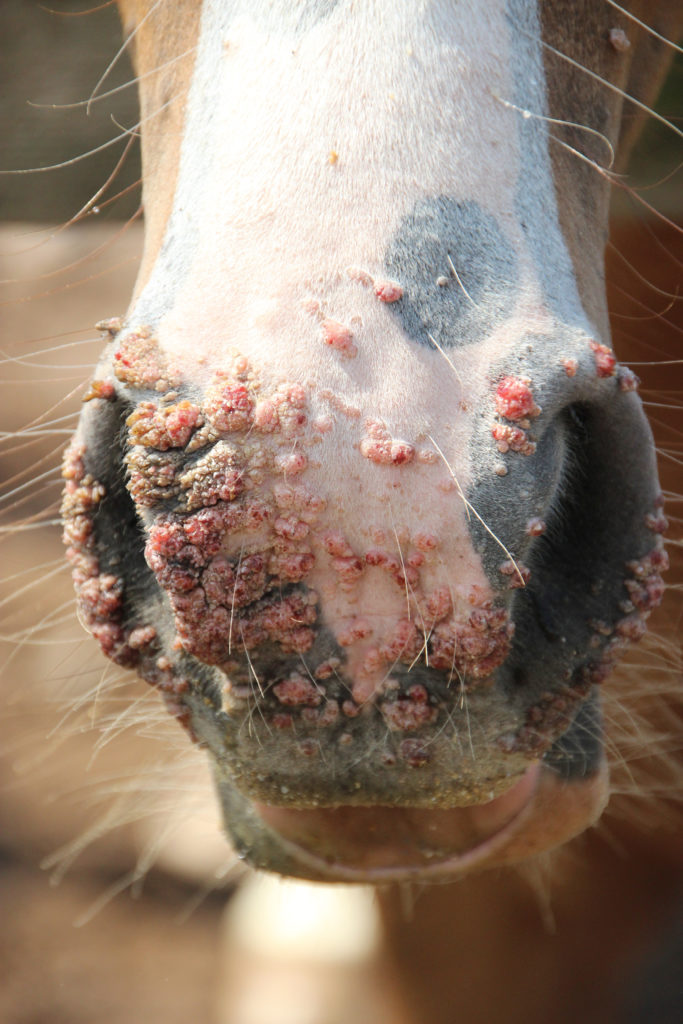Home > Horse Care > New viral source of equine warts discovered
New viral source of equine warts discovered
- December 23, 2025
- ⎯ Christine Barakat
A researcher in New Zealand has identified a new type of equine papillomavirus. Previously shown to cause warts in horses, papillomaviruses may contribute to the development of some types of skin cancer.

The novel virus was discovered when a 10-year-old Warmblood developed two thick, round masses on the front his left fetlock. About three weeks after they appeared, the masses had grown to more than an inch in diameter. The horse’s owner called the veterinarian who, noting the unusual size and location of the growths, performed a biopsy and sent the sample to Massey University for analysis. “The referring veterinarian thought it was going to be an unusual sarcoid,” says John Munday, PhD, BVSc. “She decided to confirm the diagnosis [because] a sarcoid would have been hard to treat where it was.”
Histology revealed the lesion was consistent with a “wart,” ruling out sarcoids as the diagnosis. “Warts are caused by equine papillomaviruses (EcPVs) and most go away by themselves, sarcoids are caused by bovine papillomaviruses and tend to persist for longer,” says Munday.
Next, molecular testing was done to determine which type of EcPV was responsible for the lesion. “Papillomaviruses are divided into types,” explains Munday. “and each type causes distinct lesions. For instance in humans, type 1 causes warts on the hands and feet, but not cancer while type 16 causes cervical cancer, but not visible warts.” Papillomaviruses can have a similarly wide-ranging effect on horses depending on which type the horse is infected with.
[Click here to learn how to identify common equine skin diseases.]
“A high proportion of penile and sheath squamous cell carcinomas (SCC) contain EcPV-2 DNA and RNA, suggesting that EcPV-2 causes genital warts in horses that can progress to SCCs. Studies vary, but that is the case in maybe 50 to 90 percent of penile SCCs could be caused by EcPV2 infection” says Munday. “Of course the interesting thing is that it is unknown how the horses are infected by EcPV2 SCCs occur in geldings so, unlike HPV-16, EcPV2 is unlikely to be sexually transmitted, . It is possible that horses are infected with EcPV2 early if life from their mothers. This would be similar to many human PV types that typically infect us without causing symptoms. The time of infection is important as any preventative vaccine must be given before the horse is first infected by the papillomavirus type.”
Molecular testing of the wart from the horse revealed the presence of a new papillomavirus type. The novel EcPV was most similar to EcPV-1 suggesting the new virus was “likely to be within the Zetapapillomavirus genus,” the researchers reported.
The finding is significant because when you get infected by a PV type you only get immunity against that type,” says Munday. “So if a horse is infected by EcPV-1 it will be protected against further infection by EcPV-1, but not against EcPV-2 or any other types. Additionally, as is seen by HPV-1 and HPV-16, different types can cause very different diseases. Evidence from this one case suggests the new PV type is most similar to EcPV-1 and so probably will only cause self-resolving warts, but we will have to find more cases to be sure.”
The horse was treated with the topical chemotherapy drug imiquimod and the lesions disappeared within four weeks, but Munday stresses the cream may not have been the cure, and that the lesions may have gone away on their own without treatment.
Munday suggests there is no need to biopsy and analyze the DNA of all suspected EcPV lesions “unless different types are shown to have different behaviors. In this case it was interesting as the novel type resulted in a lesion that was unusual in horses and so not recognized as a wart by a very experienced vet. Knowledge that equine warts can have an unusual appearance every now and then in horses is probably an important take home message.”
Reference: “Detection of a putative novel papillomavirus type within a large exophytic papilloma on the fetlock of a horse,” Pathogens, October 2020
Don’t miss out! With the free weekly EQUUS newsletter, you’ll get the latest horse health information delivered right to your in basket! If you’re not already receiving the EQUUS newsletter, click here to sign up. It’s *free*!





